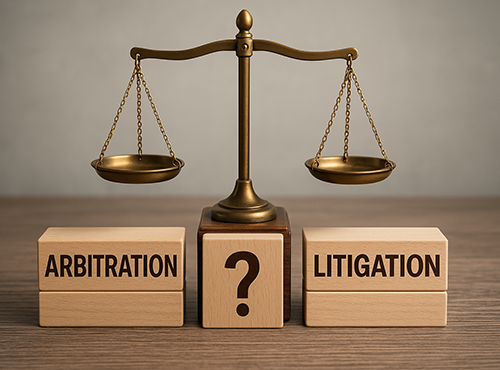Understanding Parole in India
When we talk about the criminal justice system, one term that often creates confusion is parole. In simple words, it is a form of temporary release granted to a convicted prisoner on specific humanitarian or rehabilitation grounds. Unlike a complete acquittal, it does not end the sentence; instead, it allows a prisoner to spend a limited time outside prison under certain conditions and restrictions.
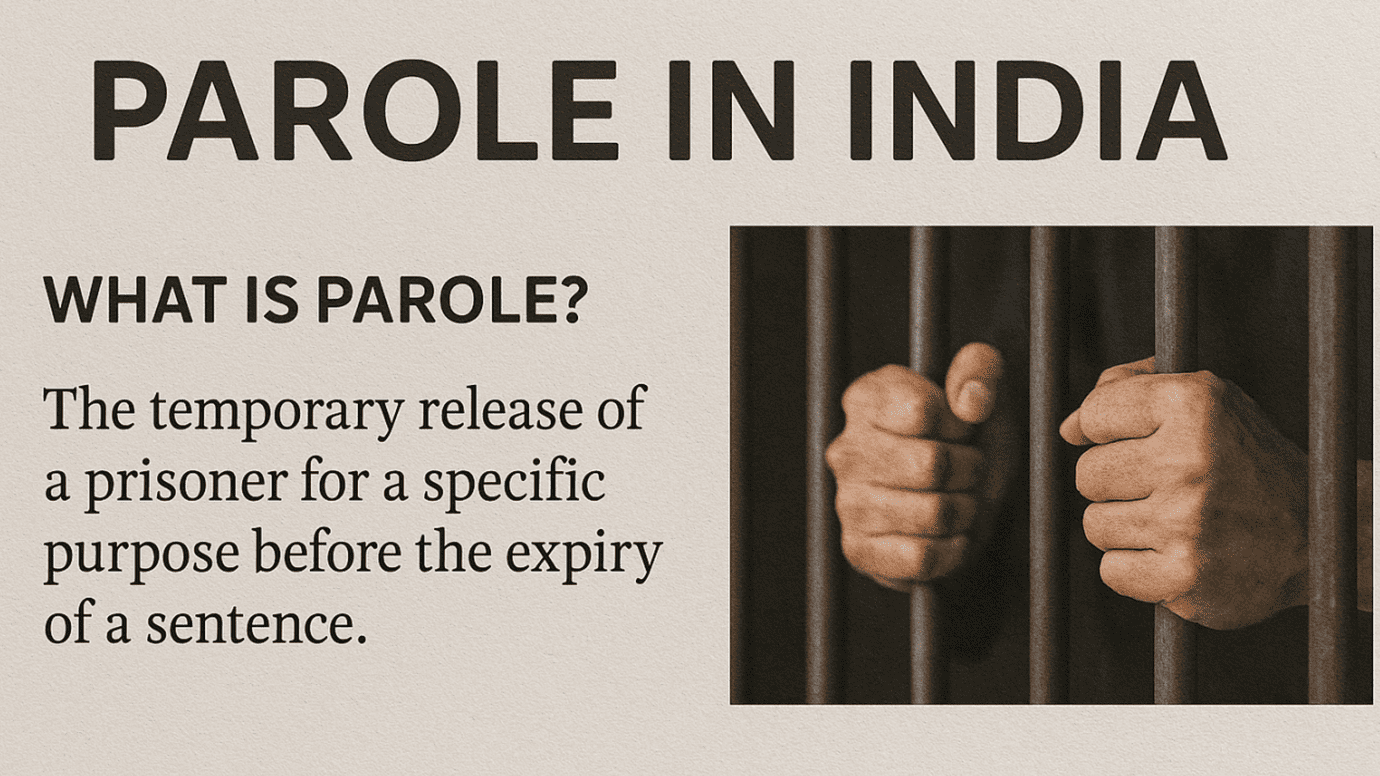
The importance of parole for prisoners cannot be overstated. For many inmates, it offers a chance to reconnect with family during critical situations such as medical emergencies, funerals, or weddings of close relatives. For families, it provides emotional relief and support at times when the presence of their loved one truly matters. Beyond humanitarian reasons, parole in India also plays a role in the reformative aspect of punishment, giving well-behaved prisoners an opportunity to prove their responsibility and reintegrate with society, even if temporarily.
It is important here to clarify parole vs bail. While both involve temporary release from custody, they are different in nature. Bail and parole differ mainly in timing and purpose: bail is granted to an undertrial (someone not yet convicted), whereas parole applies only to convicted prisoners who are serving a sentence.
This blog will explain in detail who can apply for parole, the eligibility criteria, and the rules of it. We will also touch upon parole stipulations, duration, and the legal framework that governs this area. By the end, you will have a clear understanding of when and how parole may be granted, and under what conditions it may be denied.
What is Parole?
In the Indian legal system, parole is defined as a conditional and temporary release granted to a convicted prisoner. It is not an end to the sentence but a privilege provided under specific rules of parole, aimed at serving humanitarian needs and supporting the prisoner’s rehabilitation process. Essentially, parole for prisoners allows them to step outside the prison walls for a limited period while still remaining under the authority of law.
Unlike a pardon or commutation, parole in India does not erase the punishment. Instead, it suspends incarceration for a fixed duration, such as 15 days, 30 days, or more, depending on state rules and the nature of the request. During this period, the individual must adhere strictly to certain parole restrictions, such as staying within a specified jurisdiction, reporting regularly to the local police station, and avoiding any unlawful activities. Failure to respect these parole conditions may result in immediate cancellation and return to prison.
Therefore, in simple terms, parole in India is a carefully regulated system of supervised release that balances compassion for the prisoner’s personal circumstances with the safety and order of society. It is not a loophole to avoid punishment but rather a legal mechanism that underscores the reformative approach of the justice system.
Who Can Apply for Parole in India?
In the context of parole in India, it is important to understand that this legal relief is not open to everyone in custody. Parole is a facility meant specifically for convicted prisoners who have already been sentenced by a court of law. It does not apply to undertrials, meaning individuals who are still facing trial and have not yet been convicted. For such persons, the legal remedy is bail, which is why understanding the difference between bail and parole is essential. To know about laws regarding bail, you can read our detailed blog on Bail laws in India.
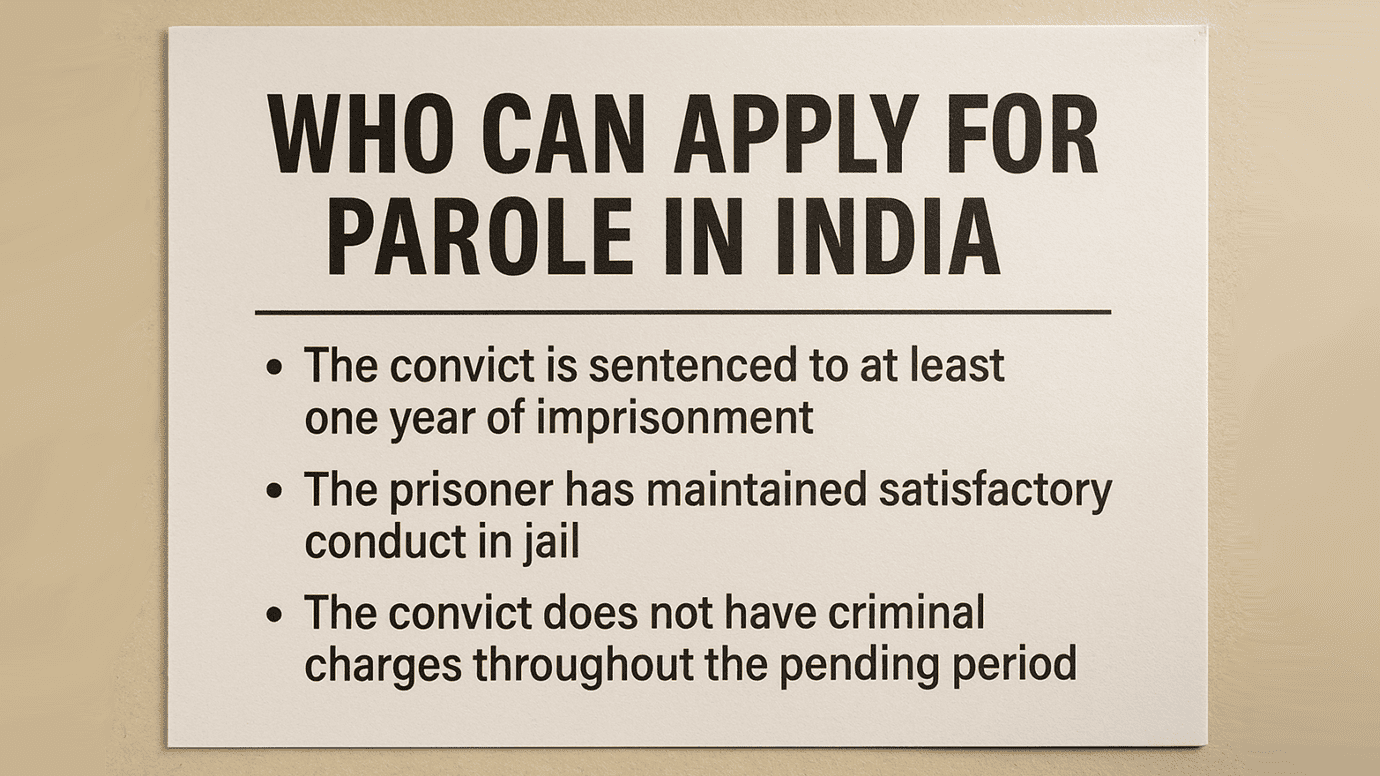
Eligible Applicants
Parole is typically granted when certain rules are satisfied. A convicted inmate can apply for parole if:
- They have displayed good conduct while serving their sentence.
- They have served a minimum portion of their sentence, as required by state-specific laws.
- Their release does not pose a threat to society or disrupt public order.
- They agree to comply with all parole conditions, such as reporting to authorities and respecting restrictions.
Who is Excluded?
Not every prisoner qualifies for parole in India. The following categories are generally excluded under the rules:
- Repeat offenders or habitual criminals with a history of re-offending.
- Prisoners convicted of serious crimes such as terrorism, organized crime, and offences against the state.
- Inmates who have violated parole stipulations in the past.
- Those who present a security risk or whose release may disturb public peace.
Special Cases Where Parole May Be Granted
Courts and prison authorities recognize that life’s emergencies do not stop even for those behind bars. Hence, parole is often allowed in special circumstances such as:
- Medical emergencies of the prisoner or an immediate family member.
- Death in the family, where presence of the prisoner is necessary to perform last rites.
- Marriage of a close relative such as a son, daughter, brother, or sister.
- Other urgent humanitarian reasons that justify temporary release within the permitted duration.
In all these cases, the prisoner must still follow strict parole stipulations, which include reporting requirements, travel limitations, and other restrictions. Violation of any of these conditions can lead to immediate cancellation of the release.
Ultimately, parole in India is not a right but a discretionary privilege, subject to the careful evaluation of each application against the rules of parole. It is designed to provide relief in genuine cases while ensuring the security of society is never compromised.
Conditions Attached to Parole
While parole in India serves as a humanitarian relief for convicted prisoners, it is not an unrestricted freedom. Every release is bound by strict parole conditions that ensure the prisoner’s temporary liberty does not compromise public safety or disrupt the justice process. These rules are carefully designed to balance compassion with control.
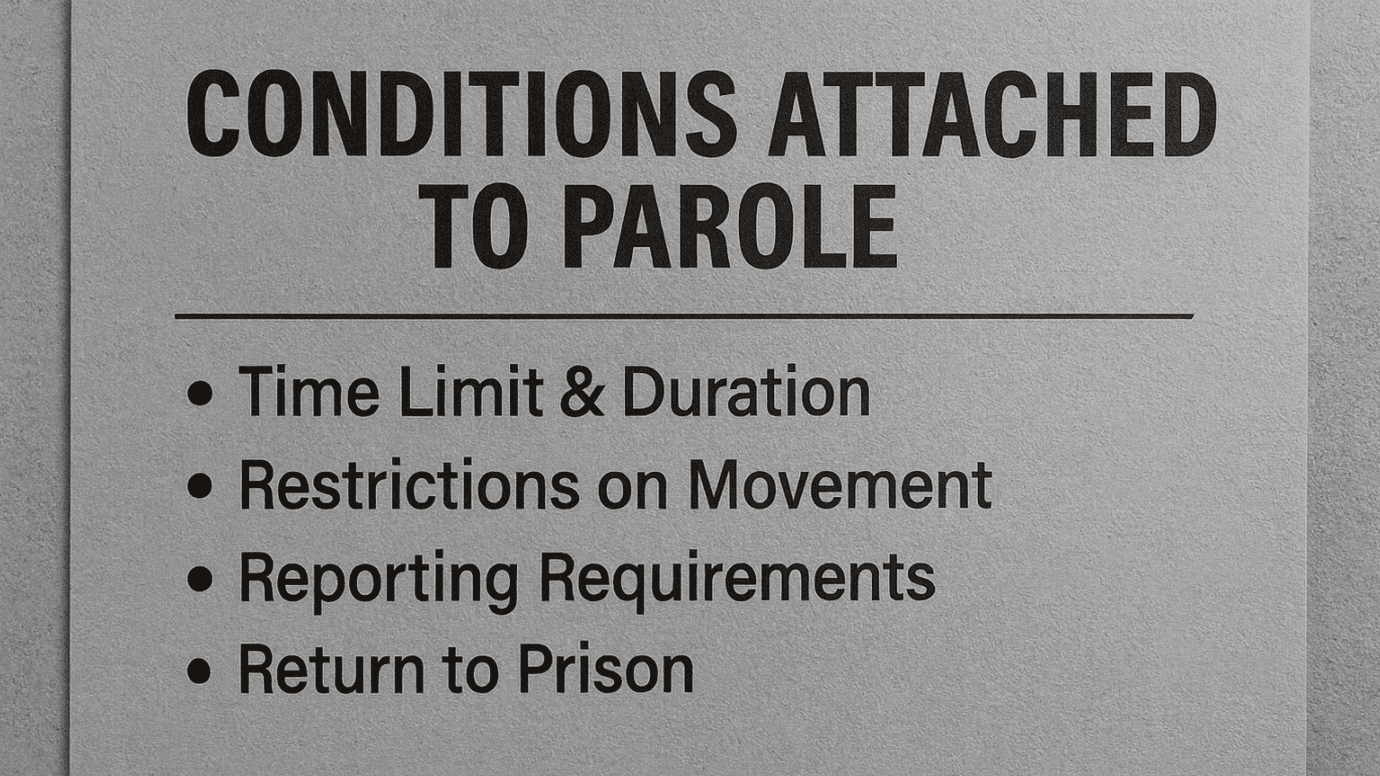
1. Time Limit and Parole Duration
The first and most important condition relates to the parole duration. In most states, parole is granted for a limited period, often 15 days to 30 days, though it can be extended under exceptional circumstances such as serious medical needs. The actual timeframe depends on state-specific guidelines and the nature of the application. Once the approved parole duration ends, the prisoner must return to custody immediately without any delay.
2. Restrictions on Movement
Every prisoner on parole is subject to strict restrictions regarding movement. Typically, they are required to stay within a specified city, district, or state boundary. Traveling outside these areas without prior permission is a direct violation of the parole stipulations. These boundaries ensure that the temporary release is used only for genuine purposes, such as attending a family function or seeking medical care, and not for unlawful activities.
3. Reporting Requirements
Another common element of parole conditions is the obligation to regularly report to the nearest police station or designated authority. This helps the administration monitor compliance with the rules of parole. In some cases, the reporting frequency may be daily or weekly, depending on the seriousness of the conviction and the purpose of parole in India.
4. Return to Prison
At the end of the parole duration, the prisoner must return to prison immediately. Failure to surrender on time is treated as an offence and can lead to cancellation of current parole and restrictions on any future applications. Strict adherence to this requirement is what differentiates genuine rehabilitation efforts from misuse of the system.
5. Additional Stipulations
Apart from these core conditions, authorities may impose additional parole stipulations, such as avoiding contact with certain individuals, refraining from political activities, or not participating in public gatherings. These tailored parole conditions ensure that every release remains consistent with the law’s intent and does not threaten social order.
In summary, parole in India is not a blanket permission to roam freely but a conditional release with clear boundaries. The combination of limited duration, geographical restrictions, regular reporting, and mandatory return to prison ensures that parole for prisoners serves its intended humanitarian purpose without undermining the justice system.
Process of Applying for Parole
Applying for parole in India is not as simple as submitting a request; it involves a structured legal and administrative process guided by the rules of parole. Since parole for prisoners is a discretionary relief and not an absolute right, every application must demonstrate genuine grounds, proper documentation, and compliance with all conditions.
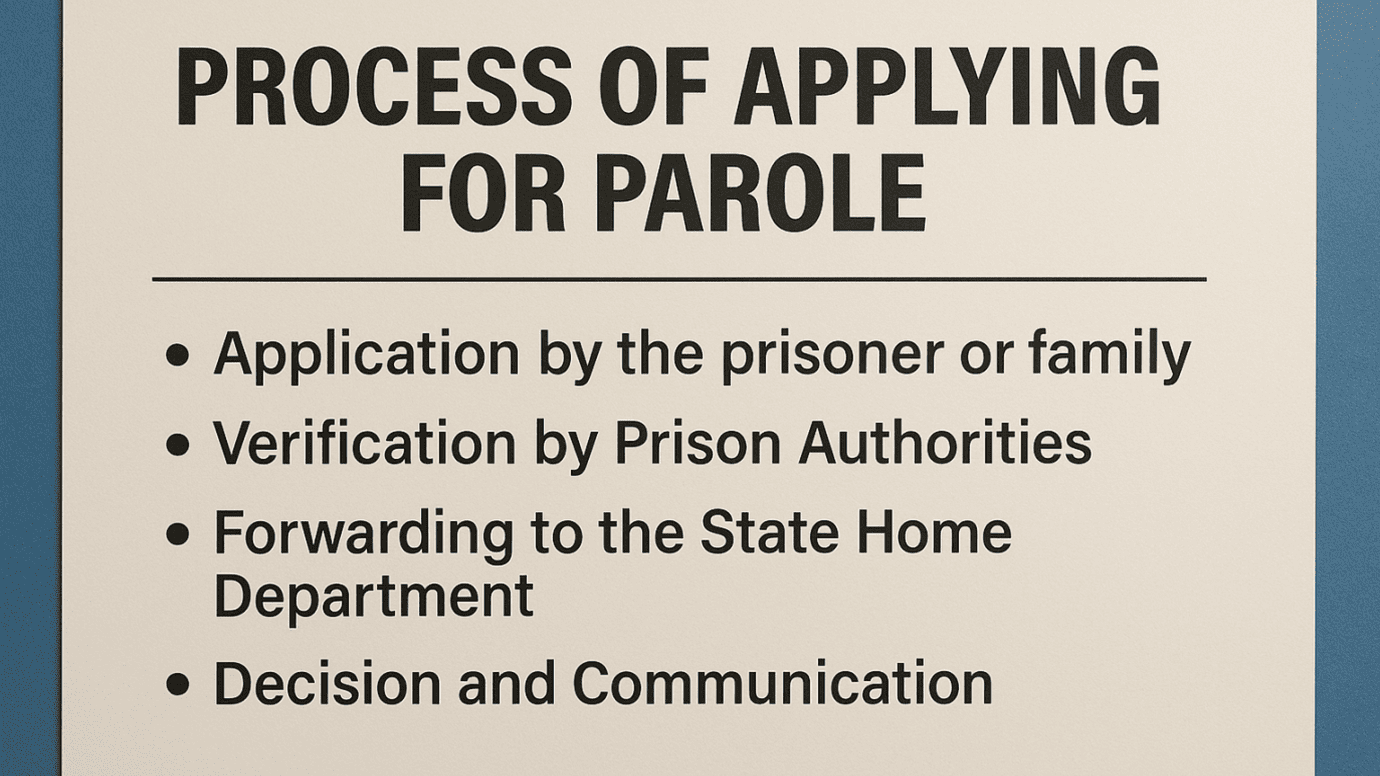
1. Step-by-Step Procedure
- Application by the Prisoner or Family
The process begins with a written application submitted either by the prisoner from inside the jail or by their family members on the outside. This application must clearly state the reason for seeking parole, whether it is for medical treatment, a family emergency, or another humanitarian ground. It should also specify the required duration. - Verification by Prison Authorities
Once received, prison authorities conduct a thorough background check on the prisoner’s conduct and criminal record. They also assess whether granting parole would pose a risk to society. The prisoner’s behavior, past compliance with parole stipulations, and likelihood of adhering to restrictions are taken into account. - Forwarding to the State Home Department
After verification, the prison authorities forward the application, along with their recommendations, to the State Home Department. This department plays a decisive role in interpreting the rules of parole and ensuring that the application aligns with state-specific guidelines. - Decision and Communication
The final decision is made by the competent authority, usually the State Home Department or in some cases the Governor, depending on the seriousness of the offence. If approved, the order specifies the parole conditions and the exact duration. If rejected, the applicant has the right to seek legal remedies.
2. Importance of Proper Documentation
Supporting documents are crucial for a successful application. Medical certificates, death certificates, marriage invitations, or other relevant records strengthen the case by proving the urgency and genuineness of the request. Without these, the application may be rejected even if the reason is valid.
3. Role of Legal Assistance
Navigating the parole in India process can be challenging due to procedural complexities and strict restrictions. This is where professional legal assistance becomes valuable. Experienced lawyers can help draft a strong application, ensure compliance with parole stipulations, and even challenge rejections in court.
In essence, applying for parole is not merely a formal request—it is a legal procedure governed by strict rules of parole. Understanding the step-by-step process, submitting accurate documentation, and seeking timely legal help can make the difference between approval and denial.
Difference Between Parole and Furlough
When discussing parole in India, many people mistakenly use the term interchangeably with “furlough.” While both involve temporary release of a prisoner, they serve very different purposes under the rules of parole and prison regulations. Understanding this difference is crucial for families and inmates so they can apply for the right relief.
1. Parole
Parole for prisoners is primarily need-based or emergency-oriented. It is granted on humanitarian grounds such as medical treatment, attending a funeral, or participating in a close family member’s wedding. The parole duration is usually limited (15–30 days) and comes with strict conditions, restrictions, and compliance with specific parole stipulations. Violating these terms can result in cancellation and denial of future applications.
2. Furlough
Furlough, on the other hand, is not linked to emergencies. It is an earned leave granted to a prisoner as a reward for good conduct and continuous service of their sentence. Unlike parole, furlough is more of a right than a privilege and may be given periodically to encourage rehabilitation. Furlough does not require extraordinary grounds like illness or family crisis; instead, it is a part of the correctional system designed to help reintegrate prisoners into society.
In short, while parole in India focuses on addressing urgent humanitarian needs, furlough functions as a structured break aimed at rehabilitation. Both mechanisms ensure that the prisoner’s temporary release remains within legal boundaries, but their purposes, conditions, and implications are entirely different.
FAQs
A. Parole in India is a temporary release granted to a convicted prisoner on humanitarian grounds such as medical treatment, funerals, or family functions. It does not end the sentence but allows the prisoner limited freedom under specific parole conditions and restrictions.
A. Parole is generally available to convicted inmates with good conduct who have served a minimum portion of their sentence. Eligibility also depends on compliance with the rules of parole and whether the applicant poses any security risk to society
A. No. Undertrial prisoners cannot apply for parole; they must seek bail instead. This is why it’s important to understand parole vs bail. While bail is for those awaiting trial, parole applies only to convicted prisoners already serving a sentence.
A. Typical grounds include medical emergencies, death in the family, marriage of a close relative, or other urgent humanitarian reasons. In all cases, the applicant must still follow the parole stipulations and adhere to the approved duration.
A. The parole duration is usually between 15 to 30 days, though it may be extended in exceptional cases depending on state rules. Every extension is subject to strict conditions and administrative approval.
A. The core parole conditions include staying within designated areas, reporting regularly to the police, and returning to prison once the parole duration ends. Violating these restrictions can result in cancellation.
A. Under the rules of parole, repeat offenders, habitual criminals, and those convicted of serious crimes like terrorism or organized crime are generally excluded. Inmates who have earlier violated parole stipulations may also be denied.
A.Violation of parole stipulations—such as overstaying the duration or engaging in unlawful activities—can lead to immediate cancellation of the release. It may also affect the prisoner’s chances of getting parole in the future.
Conclusion
To sum up, parole in India is a carefully regulated form of temporary release designed to balance humanitarian needs with the safety of society. Parole for prisoners is not a right automatically available to everyone but a privilege granted only when specific rules of parole are satisfied. Generally, convicted prisoners who maintain good conduct and present genuine reasons—such as medical emergencies, family funerals, or close relative’s marriages—can apply for parole, while undertrials must seek bail, which is why it is important to distinguish between bail and parole.
The grant of parole always comes with strict conditions, including compliance with parole stipulations, adherence to geographical restrictions, and respect for the approved duration. Any violation can lead to cancellation and negatively affect future applications. At the same time, when applied for correctly and on valid grounds, parole allows prisoners to stay connected with their families and handle critical personal matters, reflecting the reformative spirit of the justice system.

For families, it is reassuring to know that the legal framework provides this opportunity and that authorities recognize the human side of incarceration. However, the process can often be complex, involving documentation, verification, and legal scrutiny. If you need professional guidance in drafting a strong parole application, ensuring compliance with the rules of parole, or challenging a rejection, a strong legal team will be helpful to assist you at every step.
With the right approach, understanding of parole conditions, and expert legal support, securing parole in India becomes a realistic and effective way to safeguard the rights and dignity of your loved ones. For more information on other types of cases and laws, go to our Homepage.
Disclaimer:
This blog is intended for educational and informational purposes only. It should not be taken as legal advice or relied upon as such. Cases of Parole in India are sensitive and often vary based on individual circumstances, which may affect the legal remedies available.
If you or someone you know is facing such challenges, it is advisable to seek guidance from a qualified lawyer or legal professional. For safe and confidential support, you may also consider reaching out to trusted legal platforms such as Adlegal.


